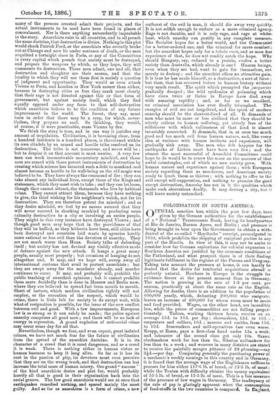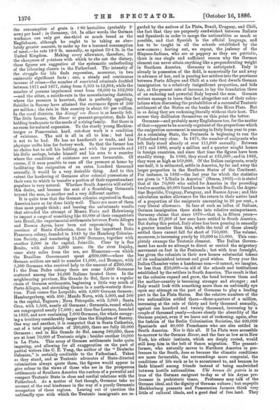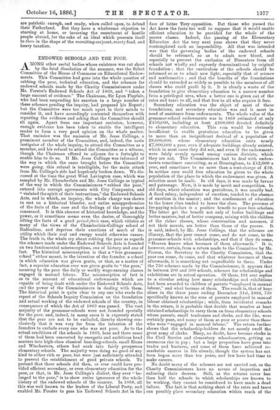COLONISATION IN SOUTH AMERICA.
OFFICIAL sanction has, within the past few days, been given by the German authorities for the establishment of a " National " Transoceanic Bank, having its headquarters, at Rio de Janeiro, Buenos Ayres, and Berlin ; and pressure is being brought to bear upon the Government to obtain a with- drawal of the so-called " Heydtsche " rescript, promulgated in. 1859, which prohibits the shipping of emigrant parties to any part of the Brazils. In view of this, it may not be amiss to , consider how far German aspirations for colonial expansion in Southern America are justified by the economic conditions of the Fatherland, and what prospect there is of their finding legitimate fulfilment in the regions of the Parana and Uruguay. Taking into account the pressure at home, it can hardly be denied that the desire for territorial acquisitions abroad' is perfectly natural. Nowhere in Europe is the struggle for existence fiercer at the present moment than in Germany. The nation is growing at the rate of F3 per cent, per annum, practically at about the same rate as the English. Allowing for deaths, there is an addition to the population of.. 600,000 yearly, which, deducting 200,000 who emigrate, leaves an increase of 400,000 for whom room must be made and food provided. Wages, on the other hand, are incredibly low, while the prices of commodities are not falling proper- tionately. Tailors, working thirteen hours, receive on an average 15d. to 18d. per day ; shoemakers, 13d. to 1 Od. ;. carpenters and colliers, 16d. ; masons and smiths, from 15d. to 19d. Ironworkers and mill-operatives fare oven worse. Krupp, at Essen, pays a first-class hand under 13s. a week, and labourers of the second class get only 10s. Saxon clockmakers work for less than 6s., Silesian nailmakers-for less than 4s. a week ; and weavers in many districts are stated to receive the painfully meagre pittance of 28 pfenning—say, 314—per day. Comparing generally the purchasing power of a mechanic's weekly earnings in this country and in Germany,. it is found that the average wage of the Englishman suffices to . procure for him either 117.6 lb. of bread, or 23'5 lb. of meat ; 1 while the Teuton with difficulty obtains the money equivalent of 55.5 lb. of bread, or 15.5 lb. of meat. This is a fair measure of the pressure of low wages in Germany. The inadequacy of the rate of pay is glaringly apparent when the consumption of food-stuffs in the two countries is compared. In England, the consumption of grain is 1.80 hectolitre (probably 2. now) per head ; in Germany, -54. In other words, the German workman can only get one-third as much bread as the Englishman, although he ought to be taking an abso- lutely greater amount, to make up for a lessened consumption of meat,—he eats 18.9 lb. annually, as against 39.4 lb. in the United Kingdom. Making every allowance, therefore, for the cheapness of potatoes with which to eke out the dietary, these figures are suggestive of the systematic underfeeding of the labouring classes in the Fatherland. The intensity of the struggle for life finds expression, moreover, in two ominously significant facts ; one, a steady and continuous increase of crime—the number of convicted criminals doubled between 1871 and 1877, rising from 6,403 to 12,804, while the number of persons imprisoned went from 68,000 to 102,000 —and the other, a suicide-rate in the manufacturing districts, where the pressure is heaviest, that is perfectly appalling. Suicides in Saxony have attained the enormous figure of 300 per million ; the rate in this country is about 66 per million. In the rural districts, the Kampf tan Ratan is as heavily felt. The little farmer, the Batter or peasant-proprietor, finds his holding inadequate to the needs of a rising family. But there is no room for natural expansion. To the sturdy young Mecklen- burger or Pomeranian, hard, out-door work is a condition of existence. The soil is all in all to him ; but land is not to be had. He has no handicraft or trade, and his physique unfits him for factory work. So that the farmer has no choice but to sell his holding, and with the proceeds and his little savings, betake himself and his sons to a country where the conditions of existence are more favourable. Of course, if it were possible to ease off the pressure at home by facilitating the emigration of an extra hundred thousand annually, it would be a very desirable thing. And to this extent the hankering of Germans after colonial possessions of their own to which to transfer a portion of their superabundant populace is very natural. Whether South America will satisfy this desire, and become the seat of a flourishing Germania beyond the seas, is another and a very different matter. It is quite true that the German colonies organised in South America have so far done fairly well. There are more of them than most people think ; and barring the unfortunate results that attended the attempt of Messrs. Pinto and Holzwiessig to import a cargo of something like 40,000 of their compatriots into Brazil, the experimental settlements between Porto Allegro and Buenos Ayres, have been not unpromising. In the province of Santa Catherina, there is the important Dolia Francesca colony, founded in 1849 by the Hamburg Colonisa- tion Society, and numbering 15,000 Germans, together with another 2,000 in the capital, Joinville. Close by is Sao Benito, with about 3,000 more. On the river Itajahy, some sixty miles from the sea, are Blumenau—on which the Brazilian Government spent £600,000—where the German settlers are said to number 11,000, and Brusque, with 2,500 Germans who received help to the amount of £200,000. Ii the Dom Pedro colony there are some 3,000 Germans scattered among the 16,000 Italians located there. In the neighbouring province, Rio Grande do Sul, there is a regular chain of German settlements, beginning a little way south of Porto Allegro, and stretching thence in a north-westerly direc- tion. First comes Sao Leopoldo, with 4,000 German farmers ; Hamburgerberg, with 400; Mundo Novo, with 3,000, and 500 in the capital, Taguara ; Nova Petropolis, with 3,000; Santa Cruz, with 1,500, nearly all Germans ; Germania, round which are congregated nearly 17,000; and then Sao Lorenzo, founded in 1850, and now containing 7,000 Germans, the whole occupy- ing a territory considerably larger than the Kingdom of Saxony. One way and another, it is computed that in Santa Catherina, out of a total population of 200,000, there are fully 50,000 Germans ; and in Rio Grande do Sul, among 580,000, there are at least 70,000 of Teutonic origin ; besides another 10,000 in La Plata. This array of German settlements looks quite imposing, and allowing for all exaggeration on the part of partial writers like C. E. Yung, the author of the "Deutsche Colonien," is certainly creditable to the Fatherland. Taken as they stand, and as Teutonic advocates of State-directed colonisation always quote them, the figures would appear to give colour to the views of those who see in the prosperous settlements of Southern America the nucleus of a powerful and compact Teutonic State in close and cordial relations with the Fatherland. As a matter of fact though, Germans take no account of the real hindrance in the way of a purely Germanic occupation of these regions. Leaving out of question the unfriendly eyes with which the Teutonic immigrants are re- garded by the natives of La Plata, Brazil, Uruguay, and Chili, the fact that they are purposely sandwiched between Italians and Spaniards in order to merge the nationalities as much as possible, and that Spanish Is the official language, and has to be taught in all the schools established by the new-comers ; leaving out, we repeat, the jealousy of the Hispano-Indians, who are as peppery as they are patriotic, there is one single and sufficient reason why the German element can never attain anything like a preponderating weight in Southern America. Germany is anticipated. Italy is already in possession of the field, is numerically far and away in advance of her, and is pouring her settlers into the provinces between Porto Allegro and Chili at a rate that dwarfs German immigration to a relatively insignificant proportion, and bids fair, at the present rate of increase, to lay the foundation there of an enduring and powerful Italy beyond the seas. German writers manage to leave this fact altogether out of their calcu- lations when discussing the probabilities of a successful Teutonic settlement of the States on the banks of the River Plate. But in so doing they are reckoning literally without their host. The sooner they disillusion themselves on this point the better. Germans—and probably many Englishmen too, for the matter of that—appear to be scarcely cognisant of the proportions which the emigration movement is assuming in Italy from year to year. As a colonising State, the Peninsula is beginning to run the Fatherland very close. In 1871, the number of emigrants who left Italy stood already at over 111,000 annually. Between 1871 and 1880, nearly a million and a quarter sought homes in foreign countries, and since that time the figures have been steadily rising. In 1880, they stood at 135,000; and in 1883, they were as high as 169,000. Of the Italian emigrants, nearly one-half, it is estimated, settle in America, by far and away the larger proportion in the Southern States of the Continent. For instance, in 1882—the last year for which the statistics are given in " L'Italia in America" (Genoa, 1883)—it is stated that of the 70,000 who sailed for America in the preceding twelve months, 40,000 found homes in South Brazil, the Argen- tine Republic, Uruguay, Paraguay, and Buenos Ayres ; and this calculation makes allowance for the return to their native land of a proportion of the emigrants amounting to 20 per cent., a very liberal allowance. In face of such an influx of Italians, German immigration there sinks into relative unimportance. Germany claims that since 1870—that is, in fifteen years— more than 27,000 of her sons have settled in South America. But during this period, Italy alone has been pouring in annually a greater number than this, while the total of those already settled there cannot fall far short of 750,000. The volume, moreover,is increasing yearly by 10,000 to 15,000. This com- pletely swamps the Teutonic element. The Italian Govern- ment has made no attempt to direct or control the migratory movement on foot in the Peninsula ; but with true foresight, has given the colonists in their new homes substantial tokens of its undiminished interest and good wishes. Every year the Italian Chamber votes a handsome sum—it cannot, we imagine, be less than £50,000—in aid of the schools and institutions established by the settlers in South America. The result is that as the colonies expand and grow, the bond between them and the mother-country is becoming stronger and stronger ; and Italy would look with something more than an unfriendly eye upon any attempt on the part of Germans to play a leading part in the La Plata States. But the relative numbers of the two nationalities settled there—three-quarters of a million, increasing at the rate of thirty and forty thousand annually, against one hundred and twenty thousand, increasing by a couple of thousand yearly—shows clearly the absurdity of the German project, even if we leave out of reckoning, again, after the fashion of the Berlin Colonisation Societies, the 400,000 Spaniards and 80,000 Frenchmen who are also settled in South America. Nor is this all. If La Plata were accessible to-morrow to the German Bauer, and the fare as low as to New York, his ethnic instincts, which are deeply rooted, would still keep him in the belt of Saxon migration. The peasant- farmer, who naturally moves to Northern America in pre- ference to the South, does so because the climatic conditions are more favourable, the surroundings more congenial, the conditions of life such as he is accustomed to, and because he finds himself among friends instead of being sandwiched between hostile nationalities. Ubi bonunt ibi patria is as true of the German emigrant to-day as of his Aryan pre- decessor in prehistoric times. Professors may talk of the German ideal, and the dignity of German culture ; but eupeptic Mecklenburg peasants and Pomeranian farmers think very little of cultural ideals, and a good deal of free land. They are patriotic enough, and ready, when called upon, to defend their Fatherland. But they have a wholesome objection to starving at home, or incurring the resentment of hostile people abroad, for the sake of an ideal which presents itself to them in the shape of the recruiting-serjeant, scanty food, and heavy taxation.




































 Previous page
Previous page